
Gerd-Helge Vogel (born 18 April 1951) is a German art historian.

Gerd-Helge Vogel (born 18 April 1951) is a German art historian.
Vogel was born in Zwickau, Saxony and grew up as the son of the dentist Helmut Vogel and his wife Lisa, née Leupold, in Hartenstein in the Ore Mountains. From 1966 to 1970 he visited the Extended Secondary School (EOS) in Aue in Saxony, where he simultaneously completed vocational training as a lathe operator in the Blema company. After the Abitur in 1970, even before taking up his studies of Art history and Niederlandistik at the Humboldt-Universität zu Berlin, he did (HUB) will complete eighteen months of basic military service as part of compulsory military service. In 1976 he completed his studies with the professors Peter H. Feist and Harald Olbrich with the diploma.
Vogel started his career as a research assistant at the Centre for Art Exhibitions of the GDR-Neue Berliner Galerie (ZfK) in the Altes Museum in Berlin, where he co-curated about 35 international art exhibitions, which were realized in Berlin and other cities of the GDR within the framework of cultural agreements of the GDR with other states. They provided him with practical experience in the exhibition business and gave him insight into a diverse spectrum of artistic work from antiquity. (e.g. gold treasure of the Thracians) up to the international contemporary art (e.g. Denmark). He was confronted with almost all art genres and art epochs, which ensured his openness and interest in art phenomena of all kinds. At the same time he gave guest lectures on Old Dutch painting at the HUB, so as not to lose the connection to research and teaching during his practical work in the exhibition field.
From 1979 to 1982 Vogel graduated from the Ernst-Moritz-Arndt-University Greifswald (EMAU) a Aspirantur, which he completed with a doctorate to pursue a university career at this university. Through the research focus on the "Art of Romanticism" set here by his doctoral mother Hannelore Gärtner, Vogel was involved in this specialisation from his time as an assistant. He took part in the III to VI International Greifswald Romanticism Conference with corresponding research topics. A research stay at the Vrije Universiteit (Amsterdam) with Professor Ilja Veldman offered him the prerequisites for his habilitation. (1989) "The dream of Batavian Arcadia. Studies on the theory and practice of historicism in Dutch painting around 1800".
After the German reunification Vogel achieved the status of Privatdozent. Since 1994 he has revived the tradition of the "International Greifswald Romantic Conferences" to further research the history of art at the University of Greifswald and thus organized the VI. to XII. Romanticism Conference, for which he also edited the scientific conference volumes. Gradually he was able to establish an extensive network of international research, with which he realised various publication projects at home and abroad. Among his friends are the professors Konstanty Kalinowski (Poznań), Minoru Saito (Hiroshima), Juhan Maiste (Tallinn, Tartu), Gao Jianping (Beijing), Zdravko Radman (Zagreb), Joao Vicente Ganzarolli de Olivera (Rio de Janeiro), Wanghen Chen (Wuhan), Shenbing Zhang (Tsingtau), Jale Nejdet Erzen (Ankara) and the doctors Dariusz Kacprzak (Szczecin), Thorkild Kjærgaard (Nuuk). This led him to many international congresses in France, Japan, China, Brazil, Finland, Czech Republic, Latvia, Turkey and Great Britain. A six-week travel grant from the Kachima Foundation to Japan also enabled him to conduct comparative research on garden design, which has resulted in numerous publications.
After the expiry of his temporary contract with EMAU, Vogel went to the Estonian Academy of Arts in 1999 and 2001 as Guest Professor for one semester at a time to Tallinn. In the meantime, he has organised various art exhibitions with the museums in Zwickau, Jena, Greifswald, Güstrow, Cottbus, Poznań, etc. During research stays in the Strang Print Room of the "University College" in London, in the Witt Library of the Courtauld Institute of Art , in the Department for Illuminated Manuscripts at the British Library and in the Natural History Museum. In London he extended and deepened his international scientific experience.
In 2005 he was offered the Department Design at the Zurich University of the Arts (ZHdK) to develop an independent course in the theory and history of scientific illustration for the course Scientific Visualization, which he ran until his retirement in 2016. At the same time he has since then been active in Germany as a freelance art historian and works as curator of exhibitions, as organizer of the Zurich Symposia on Scientific Illustration and the International Schloss Wolkenburg Symposia on Art as well as a publicist of numerous publications on art history.
Vogel concentrated his extensive research activities in particular on the following areas:
These research foci are reflected in nearly 40 book publications as well as in about 200 specialist publications.
Gerd Zacher was a German composer, organist, and writer on music. He specialized in contemporary compositions, many of which feature extended techniques, and are written in graphic or verbal scores. He interpreted the scores of numerous contemporary composers, including John Cage, Juan Allende-Blin, Mauricio Kagel, György Ligeti, Hans Otte, Luis de Pablo, and Isang Yun. He is also known as an interpreter of the works of Johann Sebastian Bach.

Carl Eduard Ferdinand Blechen was a German landscape painter and a professor at the Academy of Arts, Berlin. His distinctive style was characteristic of the Romantic ideals of natural beauty.

Christian Leberecht Vogel was a German painter, draughtsman and writer on art theory. His pupils included Louise Seidler, and he was the father of court painter and art professor Carl Christian Vogel.
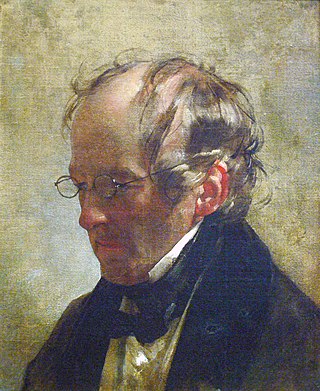
Carl Christian Vogel von Vogelstein, born Vogel, was a German painter.
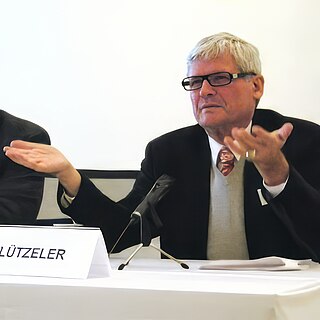
Paul Michael Lutzeler is a German-American scholar of German studies and comparative literature. He is the Rosa May Distinguished University Professor Emeritus in the Humanities at Washington University in St. Louis.
Werner Spies is a German art historian, journalist and exhibition organizer. From 1997 to 2000, he was a director of the Centre Georges Pompidou in Paris. Klaus Albrecht Schröder, director of the Albertina in Vienna, has called Spies "one of the most influential art historians of the 20th century."
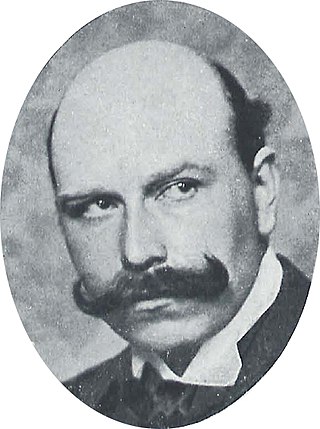
Arthur Kampf was a German painter. He was associated with the Düsseldorf school of painting.
Willibald Sauerländer was a German art historian specializing in Medieval French sculpture. From 1970 to 1989, he was director of the prestigious Zentralinstitut für Kunstgeschichte, Munich.
Herbert von Einem was a German art historian.
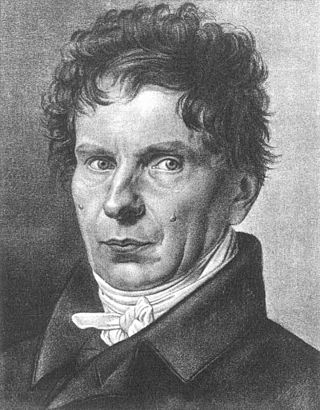
Wilhelm Titel was a German painter and academic drawing teacher at the University of Greifswald.
Gerd Rienäcker was a German musicologist.
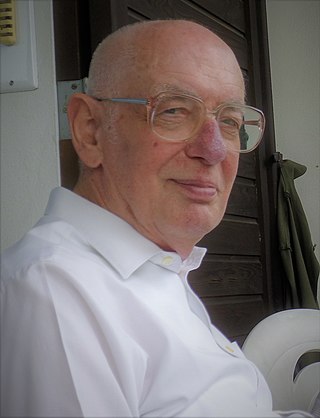
Peter Heinz Feist was a German art historian.
Peter Betthausen is a German art historian.

Peter Michel is a German art scholar, publicist and exhibition organizer.

Charles Wilda, originally Karl was an Austrian Orientalist painter. He was the elder brother of the painter, Gottfried Wilda.

Friedrich Schaarschmidt was a German landscape painter and figure painter of the Düsseldorf school of painting, conservator and art writer.
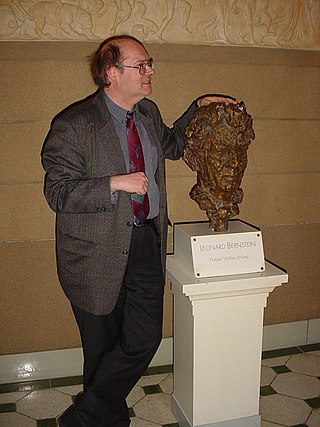
Dietmar Hiller is a German musicologist, organist, dramaturg at the Konzerthaus Berlin and docent at the Hochschule für Musik "Hanns Eisler" Berlin.

Jürgen Hamel is a German astronomy historian. His research areas are the history of astronomy in the Middle Ages and the early modern period, the period around 1800, the history of astrophysics, astronomy and cultural history, and the history of astronomical instruments.
Hans Wilhelm Hupp (1896–1943) was a German art historian, author and curator. From 1933 to 1943 he directed the Museum Kunstpalast of the city of Düsseldorf..

Heinz Trökes was a German painter, printmaker and art teacher.